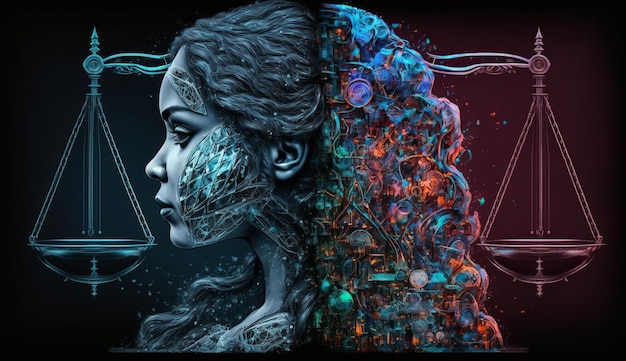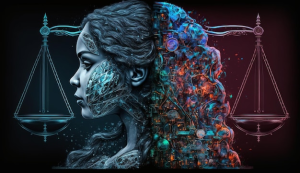AI and social justice are rapidly intertwining themes in today’s technological landscape, as scholars and activists alike explore their implications for the future of humanity. Renowned sociologist Ruha Benjamin emphasizes the pressing need for critical examination of AI ethics, warning against the oversimplified narratives of progress touted by tech elites. She argues that while these emerging technologies promise efficiency and innovation, they often perpetuate social issues and deepen existing inequalities. By disassociating mathematical computations from the core human values they impact, we risk repeating the mistakes of history, particularly for marginalized communities. Through her lectures, Benjamin calls for a re-envisioned landscape where creative imagination is harnessed to challenge the norms of contemporary society, sparking a vital discourse on how AI can truly serve the collective good.
In discussions surrounding artificial intelligence and equity, the focus shifts towards the ethical implications of technology in shaping societal values. Scholars like Ruha Benjamin highlight the importance of recognizing that advancements often emerge from a landscape of self-interest, rather than altruism. The relationship between automation and social disparities could pose significant challenges if left unexamined. By engaging with these concepts through a humanistic lens, we open pathways to address pressing social issues, preventing the reinforcement of oppressive structures. Ultimately, envisioning a future where technology aligns with our shared humanity becomes imperative in both academic circles and in the broader public discourse.
AI and Social Justice: Rethinking Our Future
In her Tanner Lectures, Ruha Benjamin discusses the critical interplay between artificial intelligence (AI) and social justice. As a prominent sociologist, Benjamin emphasizes the importance of including diverse voices in the conversation about AI technologies. She argues that while there are advancements within AI that promise efficiency, the reality often reflects a deeper issue: these systems disproportionately affect marginalized communities. To holistically approach AI development, it’s imperative to integrate social values into the equation, thereby ensuring that technologies truly serve humanity’s collective good rather than perpetuating oppressive structures.
Benjamin challenges the notion that AI can neutrally resolve social issues, highlighting the dangers of relying solely on algorithms and mathematical calculations. Such reliance ignores the historical context and the social realities faced by many. By positioning AI as a moral arbiter, we risk repeating past mistakes and reinforcing systemic injustices. Thus, advocating for an AI landscape that values human experiences and promotes social equity becomes imperative. We must ask ourselves how these technologies can be redesigned to uplift rather than suppress, ultimately reimagining a future that prioritizes justice for all.
Reimagining Human Values in Tech Development
Central to Ruha Benjamin’s argument is the call for a renewed appreciation of human values in technology development. Contrary to the often dystopian narratives put forth by tech elites, Benjamin asserts that aspirational futures can be crafted through creative inquiry. She advocates for a shift in focus from purely technical solutions to an inclusive approach that nurtures imagination and creativity among communities. This evolution hinges on recognizing the significance of the arts and humanities in shaping technological trajectories that resonate with human dignity and ethical considerations.
By integrating the principles of human values with the advancements in AI, we can promote innovations that not only advance technology but also enhance societal well-being. This means encouraging interdisciplinary collaborations where technologists work alongside sociologists, artists, and community leaders. The goal is to foster solutions that consider the complexities of human life. Ultimately, the narrative surrounding technology must pivot from one of fear and dystopia to one that embraces hope and creativity, allowing for the envisioning of a future that embodies humanity’s highest ideals.
The Dangers of Misguided AI Priorities
Benjamin’s incisive critique of AI practices points out how prioritizing efficiency and profitability often leads to significant social harm. She references troubling instances where technologies like facial recognition have perpetuated systemic injustice, resulting in false arrests and discrimination. This illustrates a core problem with current AI narratives: they often neglect the very real impact these technologies have on people’s lives. As AI continues to evolve, it is crucial to remain vigilant about the ethical implications and ensure that these tools do not reinforce existing inequalities.
Moreover, the emphasis on technical prowess without an understanding of social dynamics fosters a culture of exclusion. Many of the individuals creating these algorithms lack awareness of the societal contexts in which their technologies operate. Benjamin’s assertion highlights the need for a more interdisciplinary approach to AI development—one that marries technical expertise with social insight. By broadening the dialogue and involving voices from across various sectors, we can strive for AI solutions that genuinely enhance the human experience and address pressing social issues.
Creativity as a Catalyst for Change
Ruha Benjamin encourages a transformative approach that invites creativity into discussions about technology. Instead of merely critiquing existing systems, she advocates for a reimagination of what technology can achieve. This involves envisioning alternatives that transcend traditional boundaries—creating landscapes free from surveillance and oppressive structures. By placing creativity at the forefront, we can explore innovative pathways that challenge the status quo and inspire new forms of social engagement and more equitable outcomes in the development of AI.
Through this lens, the incorporation of creative thinking not only illuminates flaws in existing systems but also opens up possibilities for future advancements that align with humane values. Colleges and universities play a vital role in this imaginative process by fostering interdisciplinary research and inquiry. By liberating ourselves from conventional thought patterns, we enable the crafting of tech solutions that genuinely serve to uplift society and enhance the overall quality of life for all individuals.
Trust and Accountability in Technology
A central theme in Benjamin’s discussions revolves around the trust and accountability of those developing AI technologies. As decision-making increasingly shifts to algorithmic processes, the need for transparency becomes paramount. Citizens must be empowered to understand how AI systems function and the impact they have on society, especially regarding marginalized groups who are often disproportionately affected. Benjamin emphasizes skepticism towards tech elites who present themselves as benevolent leaders, urging society to demand greater accountability and scrutiny in their actions.
Creating a culturally competent tech ecosystem involves diversifying the voices at the table. It is not enough to merely enhance technology; it must also be developed with a keen awareness of social consequences. Engaging with communities and valuing their insights will lead to the creation of AI systems that genuinely reflect public interests and needs. In doing so, we can foster an environment where technology not only meets efficiency goals but also promotes social justice and upholds the dignity of all individuals.
The Intersection of Knowledge and Technology
Ruha Benjamin argues for the rich intersection between knowledge and technology, where different types of expertise must converge to create inclusive and responsible AI solutions. The reliance on technical know-how alone can lead to the oversight of vital social considerations, ultimately shaping technologies that fail to serve the entirety of society. By recognizing the importance of interdisciplinary collaboration, we can cultivate a more holistic understanding of the implications of AI technologies.
This collaborative approach necessitates incorporating diverse perspectives, especially from historically marginalized communities. Such engagement enriches the understanding of technology’s effects and contributes to the development of AI systems that prioritize equity and justice. Therefore, the future of technology lies not only in its advancements but in how it interrelates with the fabric of society, respecting diverse knowledge and human experiences.
Critiquing the Dystopian Narrative
In her lectures, Benjamin asserts that the prevalent dystopian narrative surrounding technology often overlooks the potential for positive change and visionary thinking. She challenges the notion that advancements in AI must necessarily lead to negative outcomes. Instead, by fostering an environment open to imaginative possibilities, society can work towards a future that promotes equity and justice rather than fear and oppression. Benjamin’s insights compel us to reconsider our assumptions and to actively participate in shaping a more inclusive narrative.
The framing of the future as grim and dystopian can disable creative problem-solving and stifle innovation. Benjamin encourages a shift in focus to the alternative realities we can create through collaborative efforts and shared values. By breaking down mental barriers that confine our thinking, we can open pathways toward a more hopeful vision of the future—one where technology is harnessed as a tool for justice and societal betterment, fundamentally reshaping our relationship with AI.
Engaging Communities in Technological Development
Benjamins’ approach highlights the necessity of engaging communities directly in the process of technological development. Recognizing that AI systems affect various demographics in distinct ways, it becomes crucial to involve those impacted to gain real insight into their challenges and needs. By amplifying voices from diverse backgrounds, we can create AI solutions that are not only technically proficient but also socially relevant.
Community engagement fosters a sense of ownership among users, ensuring that technologies designed to assist them genuinely reflect their values and priorities. Moreover, it combats the tendency of tech elites to unilaterally dictate the narratives around AI. By prioritizing collaborative design processes, we actively contribute to a more just and equitable tech landscape, one where inclusivity becomes the norm rather than the exception.
AI: A Tool for Empowerment or Oppression?
Ruha Benjamin’s critical examination of AI raises essential questions about its role as either a tool for empowerment or oppression. The historical and social implications of AI technologies indicate that, without careful deliberation, these tools can reinforce existing systems of inequality. As we move forward in embracing AI, it is imperative to evaluate the intended and unintended consequences on various communities. By doing so, we can strive to harness AI for the greater good, turning potential threats into opportunities for social advancement.
This narrative underlines the necessity for ethical considerations in AI development—a call to action for policymakers, developers, and community stakeholders to ensure that technology is used mindfully and responsibly. By focusing on the ethical implications and actively seeking alternative solutions that promote empowerment, we can redirect the conversation surrounding AI from one of fear to one of hope, offering transformative possibilities for humanity.
Frequently Asked Questions
How does Ruha Benjamin connect AI and social justice in her discussions?
Ruha Benjamin emphasizes that AI should be developed with a keen awareness of social justice issues. She highlights that AI technologies, often marketed as efficient, can perpetuate oppression and harm marginalized communities. Her work criticizes the notion that AI is a morally neutral tool, advocating for a deeper understanding of the social implications behind AI systems.
What are the dangers of AI according to social justice advocates like Ruha Benjamin?
Advocates for social justice, such as Ruha Benjamin, warn that AI can exacerbate existing inequalities. They cite examples like facial recognition technology leading to unjust arrests and bias in automated healthcare decisions. Benjamin argues that these technologies often prioritize efficiency over equity, making them potentially harmful to vulnerable populations.
Why does Ruha Benjamin argue against trusting tech elites in matters of AI and social justice?
Benjamin argues that we should be cautious about trusting tech elites to solve societal issues related to AI and social justice. She points out that many of these individuals prioritize personal interest and profit, which can lead to solutions that do not address the collective good. Instead, she advocates for a collaborative approach that includes diverse perspectives in AI development.
How can universities promote social justice in AI according to Ruha Benjamin?
Ruha Benjamin advocates for universities to prioritize arts and humanities alongside technical training in AI. By encouraging inquiry and creativity, she believes institutions can foster critical thinking about AI’s impact on society, helping to reimagine a future that prioritizes human values and social justice over purely technological advancement.
What role does creativity play in addressing AI and social justice issues according to Ruha Benjamin?
Benjamin argues that creativity is essential in envisioning a socially just future in the realm of AI. Instead of simply making existing systems less harmful, she urges a radical reimagining of these systems to prioritizing human needs and dismantling existing oppressive structures. This creative thinking can lead to innovative solutions that better serve humanity.
How does Ruha Benjamin view the relationship between AI technologies and historical injustices?
Ruha Benjamin draws parallels between contemporary AI technologies and historical injustices, such as the eugenics movement, pointing out that without a consideration of social history, AI can replicate harmful policies. She stresses the importance of integrating social context into the development of AI to prevent repeating past mistakes.
What is Ruha Benjamin’s vision for a future beyond current AI frameworks?
Ruha Benjamin envisions a future where AI is not just a tool for efficiency but a means to create equitable societies. She encourages thinking beyond traditional frameworks, advocating for systems that dismantle borders, reduce surveillance, and uphold human dignity, thereby transforming society to address deep-rooted social issues.
| Key Points | ||||||
|---|---|---|---|---|---|---|
| Ruha Benjamin’s Tanner Lectures emphasize that the future with AI can be optimistic rather than dystopian. | Benjamin criticizes tech elites, arguing that their altruistic claims often mask self-interest. | AI technologies can exacerbate oppression rather than alleviate it, as seen in examples like facial recognition software. | Decision-making based on algorithms can harm marginalized groups, reminiscent of past eugenics movements. | Benjamin urges for the inclusion of diverse perspectives in tech development to ensure societal relevance. | A call for creativity and imagination in the face of technological advancement is emphasized. | Universities should prioritize arts and humanities to foster critical and creative thinking about the future. |
Summary
AI and social justice are interconnected issues that require critical examination and creativity. Ruha Benjamin’s insights remind us that the future of AI does not have to be a dystopian nightmare manufactured by self-interested tech elites. Instead, we should be fostering inclusive discussions that challenge oppressive systems and envision a better world. By involving diverse voices and prioritizing creativity alongside technological development, we can create AI solutions that truly serve the collective good, ensuring that progress benefits all members of society.




